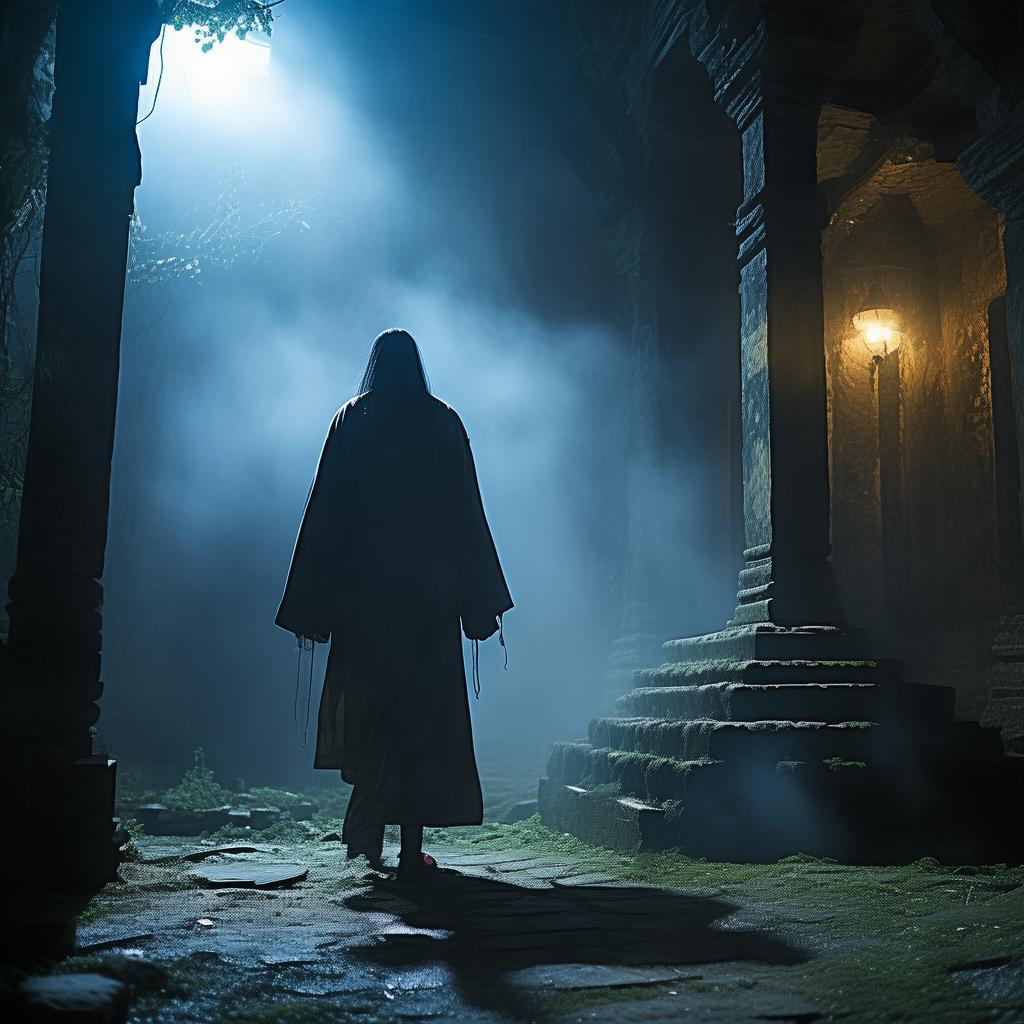The Echoes of the Demon's Ballad
In the heart of Meilanzhu, a village hidden in the folds of misty mountains, there was a tale that had been whispered through generations. It was known as "The Demon's Ballad," a haunting piece of folklore that spoke of a demon that danced on the eve of the winter solstice, luring the lost souls to their eternal rest. The villagers spoke of it with reverence and fear, for the ballad was said to be cursed, and those who dared to seek its truth would be haunted by the demon's song.
Among the scholars of the village was a young man named Liang, a man of scholarly disposition with a penchant for the arcane. He had heard the tale from his mentor, an old historian who had spent his life studying the mysteries of the world. Liang was intrigued, and he decided that he would uncover the truth behind the Demon's Ballad.
It was the eve of the winter solstice, and the village was in a state of eerie anticipation. The villagers had prepared for the night, lighting candles and setting out offerings to appease the spirits. Liang, however, was determined to seek the truth beyond the folklore.
As the night deepened, Liang ventured into the old, abandoned temple at the edge of the village. The temple had long been abandoned, its once-proud architecture now a shadow of its former self. Liang's lantern flickered in the darkness, casting eerie shadows on the ancient walls.
He had been there for hours, poring over ancient scrolls and trying to decipher the cryptic texts that spoke of the demon's origins. It was during this search that he stumbled upon a hidden chamber behind a tapestry. The chamber was filled with dusty artifacts and ancient tomes, and in the center stood a pedestal with a single, ornate book.
Liang's heart raced as he approached the pedestal. The book was bound in leather, its cover adorned with strange symbols that seemed to pulse with an otherworldly energy. He opened the book, and the room seemed to grow colder. The pages were filled with strange runes and cryptic messages, but one passage caught his eye:
"The Demon's Ballad is not a tale of the past, but a warning of the future. He who reads it shall be haunted by the demon's song, and the truth he seeks shall consume him."
Liang's resolve wavered, but his curiosity was too strong. He continued to read, and as he did, the room seemed to come alive. Shadows danced on the walls, and the air grew thick with an unseen presence. Liang felt a chill run down his spine, but he pressed on, determined to uncover the truth.
It was then that he heard it—the faint, haunting melody of the Demon's Ballad. The song was beautiful, yet it carried with it a sense of sorrow and loss. Liang was entranced, and he felt himself being drawn into the music's embrace.
As the song grew louder, Liang's vision blurred, and he found himself standing in a vast, empty field. The sky was a deep, inky black, and the stars seemed to twinkle with a strange, otherworldly glow. In the distance, he saw a figure, cloaked in darkness, dancing to the rhythm of the song.
Liang's heart pounded as he approached the figure. As he drew closer, he realized that the figure was a woman, her face obscured by the shadows of her cloak. She turned to him, and in that moment, Liang saw the truth.
The woman was the spirit of a young girl who had been lost to the demon's song centuries ago. Her eyes were filled with sorrow, and her voice was a whisper of the past.
"Why do you seek the Demon's Ballad?" she asked.
Liang stammered, "I... I want to understand, to know the truth."
The girl's eyes softened. "The truth is not what you think. The Demon's Ballad is a warning, a reminder that the past is never truly gone. It is a reflection of our own fears and desires."

Liang felt a chill run down his spine as he realized the truth. The Demon's Ballad was not a tale of a demon, but a reflection of the human condition. It was a warning that the past could consume us if we let it.
As the girl's voice faded, Liang found himself back in the temple, the room once again filled with the cold, oppressive air. He looked at the book on the pedestal, and he knew that he could never read it again.
He left the temple, the Demon's Ballad still echoing in his mind. He returned to the village, his resolve strengthened, but his heart heavy. He had uncovered the truth, but at a cost.
The villagers, seeing Liang's haunted expression, whispered among themselves, speculating about what he had seen. Liang, however, was silent, knowing that the truth was too heavy to bear.
The Demon's Ballad had changed him, and he knew that he would never be the same. But as he walked through the village, he felt a strange sense of peace, knowing that he had faced the truth and survived.
And so, the tale of Liang and the Demon's Ballad became another chapter in the folklore of Meilanzhu, a story of truth, fear, and the enduring power of the past.
✨ Original Statement ✨
All articles published on this website (including but not limited to text, images, videos, and other content) are original or authorized for reposting and are protected by relevant laws. Without the explicit written permission of this website, no individual or organization may copy, modify, repost, or use the content for commercial purposes.
If you need to quote or cooperate, please contact this site for authorization. We reserve the right to pursue legal responsibility for any unauthorized use.
Hereby declared.









